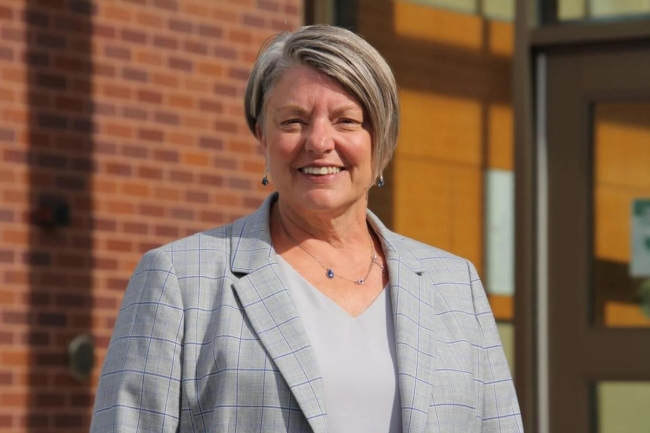You have /5 articles left.
Sign up for a free account or log in.

Danielson has been president since 2021 but has worked in the system for 25 years.
File photo/Republican Eagle
Minnesota State College Southeast president Marsha Danielson treated colleagues in a “demeaning, humiliating or bullying” way, according to a report by an independent investigator released this week. That included calling people “hon,” “girlie” and “babe”; using profanity in the workplace; and making negative comments stereotyping people of Asian descent.
A parallel investigation, conducted by the Minnesota State Colleges and Universities system’s Office of Internal Auditing, found that Danielson also violated system policies by accepting a free ticket package to a Minnesota Wild hockey game and appropriating college-owned vehicles for personal use—despite receiving a monthly $833 transportation and communication allowance.
System chancellor Devinder Malhotra said he had spoken with Danielson and was reviewing the reports to determine whether disciplinary action is warranted.
“I take this situation very seriously—building and maintaining a respectful and professional workplace is something we require of all our employees, including our leaders, and it’s central to our mission,” he said in a statement shared with Inside Higher Ed. “This is a top priority for me—I am committed to ensuring that Minnesota State College Southeast fosters an empowered and respectful workplace, and that all employees of Minnesota State adhere to the utmost in professionalism and ethical behavior.”
In a pair of back-to-back emails to the college community, Danielson addressed the findings head-on, expressing contrition for her actions.
“I want to let you know that I am taking full responsibility for my behavior and that it was never my intention to be non-inclusive, unprofessional nor hurtful in any manner,” she wrote in the second message, following a Zoom meeting about the reports. “I am taking a hard look at where I need to grow as a leader and I have begun taking immediate action. Please accept my sincere apology and know I am committed to doing better.”
She also vowed to reimburse the costs associated with the use of state-owned vehicles and the hockey tickets.
‘A Woman’s Prerogative’
The state launched the investigations of Danielson in October, after four individuals filed complaints about her conduct. The Minnesota State system’s auditing office examined allegations that Danielson misused state resources and demonstrated conflicts of interest by offering employment contracts to friends. The system hired Patty Sifferle, an independent investigator with Mendota Consultants PLLC, to investigate alleged violations of the state’s nondiscrimination and respectful workplace policies.
According to a heavily redacted version of Sifferle’s report, which was shared with Inside Higher Ed, complainants alleged that Danielson repeatedly called meetings “powwows,” told a colleague that all Asian people look alike and used profanity when she became angry.
The report also notes that Danielson complained to a colleague that Chancellor Malhotra once invited her to lunch and was slow to pick up the tab, which she attributed to the fact that “he’s Indian. He’s weird about those kinds of things. That’s his culture, I guess. He eventually got it and paid for it. You know how they are … they are … different.”
Danielson denied saying that—and much else in the report. But she did admit to calling people “hon,” sweetie” or “girl,” though she said she didn’t mean it in a derogatory way. She also acknowledged saying at fall convocation that “It’s a woman’s prerogative to change her mind,” which some colleagues and students found demeaning; she argued she was just making a self-deprecating joke and didn’t realize it was offensive.
As Danielson noted in an email to her colleagues, while the report did not find her in violation of the state’s equal opportunity or nondiscrimination policies, it did reveal “that my interactions with employees have not supported a respectful workplace and there is a need for some serious change on my part.”
Sifferle’s report expressed some incredulity at the things Danielson claimed she didn’t know. For instance, she accepted a gift from Xcel Energy to attend a Minnesota Wild NHL game, complete with food, drinks and a “party bus ride” to St. Paul; she later tweeted a picture from the game, thanking Xcel. She told investigators she “had no idea” that was a violation of the state’s gift policy—which prohibits “payment of expenses, gifts, compensation, rewards, or other benefits in connection with their employment from a source other than the state.” She said she considered the event “definitely a work function” since she doesn’t like hockey.
That was a “self-serving statement that defied logic,” the report said, noting that “she has worked in the system for over 25 years and presumably taken the ethics training multiple times. Her statement was deemed somewhat not credible.”
Teresa Valerio Parrot, founder of the higher ed communications consultancy TVP Communications (and an occasional contributor to Inside Higher Ed), said she too was surprised by Danielson’s naïveté. “The reality of presidencies is that you are under a microscope, you are publicly accountable to not just your team, but what you say on social media, and how people juxtapose that with what they think the role and expectations should be for a president,” she said. “So in 2023, all presidents should assume that what they are doing is being observed and scrutinized by their audiences. Because it is. Either search firms or search committees are doing a disservice if they aren’t mentioning to a president that the moment you start this job, you will be held to a different standard.”
Roger Moe, chair of the Board of Trustees of the Minnesota State Colleges and Universities, expressed confidence in Malhotra’s ability to rectify the situation.
“This is a vitally important matter—it has my attention and the attention of the Board of Trustees,” Moe said in a statement. “The presidents of our colleges and universities are responsible for administering the mission of the institutions they lead in accordance with the mission and goals of the Board of Trustees, and they are responsible for adhering to board policies and system procedures.”
Valerio Parrot commended Danielson and the Minnesota State system for their forthrightness but said now they have to follow through and show accountability.
“The way in which the institution has approached transparency should be something that other institutions look at as a model for making sure that situations aren’t perceived as being swept under the rug, and are being addressed,” she said. “We hear institutions talk about transparency and talk about openness; this is an institution that is saying, ‘We’re opening up our processes so that people can better understand what we’re doing.’ And the second half of that has to be: ‘And we’re opening ourselves up to feedback on how we’re doing in that.’”
In order for someone to make a significant shift in their behavior, “there has to be a true want of change from the individual and a true expectation for change from the board,” said Valerio Parrot. “And I’ll be curious to see how the two of those align or don’t align in this situation.”




